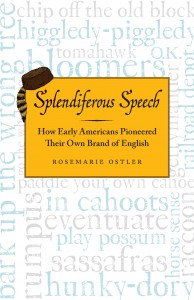Top Eight Early American Word Creations
By Rosemarie Ostler, author of Splendiferous Speech
Americans have been inventing their own vocabulary since the first English-speaking settlers landed on North American shores. Hundreds of new terms entered the English language during the country’s early days—adopted from Native American or other languages, repurposed from British English, or sometimes just made up from scratch. Here are my choices for top eight. All have intriguing origin stories or other features that make them stand out from the crowd.
Raccoon. This Algonquian word was probably the first American contribution to English, introduced by Jamestown leader John Smith in a 1608 letter home. Originally spelled rahaughcum to match the native pronunciation, it got whittled down to the more English-sounding raccoon by 1672.
Corn. In Great Britain, corn was a general term for whichever cereal was most commonly grown in an area—wheat in England, but oats in Ireland. When the first colonists encountered the North American grain known in Europe as maize, they recognized it as the major cereal crop and renamed it Indian corn. The Jamestown settlers would have starved during their first winter without supplies of corn bartered from the Algonquians. Corn was so central to American life that when the colonists started growing wheat, they at first called it English corn.
Belittle. Coined by Thomas Jefferson in his 1785 Notes on the State of Virginia, this linguistic innovation is just one example of a word invented by a founding father. It caused one British reviewer of the book to cry in anguish, “O spare, we beseech you, our mother tongue!” In spite of protests like these, the word was being used on both sides of the Atlantic by the mid-nineteenth century.
Blizzard. The meaning of this frontier word took an unusual trajectory. It originally meant a violent blow, then figuratively, a volley of words. An example of this use comes from Davy Crockett, who tells the story in his 1834 memoir of being asked to give a toast at a formal dinner and deciding to give his listeners “a blizzard.” The storm-related meaning of blizzard first appeared in midwestern newspapers during the 1850s.
Gerrymander. The country’s first piece of political slang, this term was inspired by the machinations of the Massachusetts Democratic-Republican Party, headed by Gov. Elbridge Gerry, who creatively redrew state Senate districts to keep the Federalists from gaining legislative seats. At a Federalist gathering to study the new electoral map, someone remarked that one meandering district looked like a salamander. Another attendee, probably Boston newspaper editor Benjamin Russell, exclaimed “Gerry-mander!” and a classic term was born.
Cocktail. The origin of this American word is unknown, but it was in circulation by the start of the nineteenth century. The 1809 Knickerbocker’s History of New York mentions “cock-tail” as an early American tipple. At first the word denoted a specific drink—a mixture of spirits, water, sugar, and bitters—but by the late nineteenth century, it covered any kind of alcoholic beverage.
Yankee. This iconic word for an American is likely a version of Janke (pronounced yan-kuh), a contemptuous Dutch nickname for the English in colonial America. At the time, John Bull was a nickname for a typical Englishman and Janke means “little John.” During the Revolution, the English adopted the insult, especially in the song “Yankee Doodle,” which ridiculed the scruffiness of American troops. The Americans turned the tables at the end of the war. The American army band played the song when General Cornwallis surrendered at Yorktown on October 19, 1781.
Okay. The only American word to gain international fame, okay started out as a newspaper joke. O.K. (or o.k.) stood for a humorous misspelling of all correct (oll korrect), one of several facetious abbreviations that started in the Boston papers and spread around the country. Others included o.w. (oll wright) and k.y. (know yuse). The fad died out after a few years, and o.k. would no doubt have disappeared except for a lucky coincidence. Martin Van Buren, who ran against William Henry Harrison in the 1840 presidential election, was known as Old Kinderhook for his Kinderhook, New York birthplace. Taking advantage of the matching initials, Van Buren campaigned with the catchy slogan “Old Kinderhook is O.K.” Supporters flew “O.K.” banners and even published an O.K. songbook. In the end, Van Buren lost to Harrison, but by that time, the word was here to stay. In fact, it’s so handy as a casual affirmative that languages around the world have adopted it—an impressive achievement for a joke.

No Comments
No comments yet.